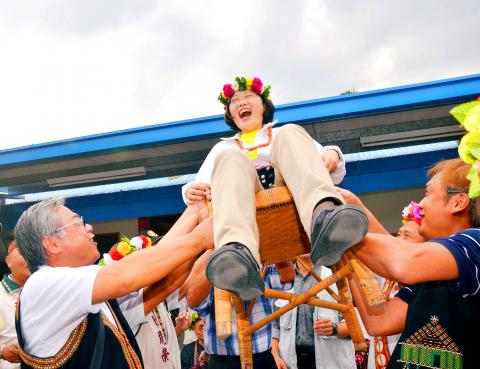Democratic Progressive Party (DPP) Chairperson Tsai Ing-wen (蔡英文) yesterday apologized to residents of Orchid Island (蘭嶼) over the government’s “outrageous” decision in 1982 to store nuclear waste on the island, saying that she hoped the waste would eventually be transferred to an alternative site.
The DPP presidential candidate, who is on a two-day campaign trip to Hualien and Taitung, also reiterated her initiative to achieve a “nuclear-free homeland” by 2025.
In her speech, Tsai apologized three times for the decision to build a nuclear waste disposal facility on the 48km2 volcanic island off the southeastern coast without prior consultation and communication with its residents, who are mostly Tao Aborigines — one of the country’s 14 recognized Aboriginal tribes.

Photo: CNA
“I am very sorry that nuclear waste was shipped and stored here in 1982 without communicating with local residents or the implementation of a democratic mechanism,” she told a group of residents in a yard in front of the Ivalino Presbyterian Church after visiting the disposal facility.
After resistance from residents, shipments of low-level nuclear waste to the island were suspended in 1996.
Residents should be the ones to decide how the waste is dealt with by coming to a consensus, possibly through a referendum, she said, adding that the DPP, as a firm supporter of a nuclear-free nation, prefers the permanent removal of the waste to an alternative site to be determined in the future.
Tsai pledged to improve infrastructure on the island with projects such as an airstrip for larger planes and a harbor for sightseeing yachts, and to study the possibility of the residents taking operational control of compensation funds paid by Taiwan Power Co.
The DPP’s “2025 Nuclear-Free Homeland Initiative” aims to phase out nuclear power by 2025 by decommissioning the three nuclear power plants currently operational, preventing the commercial operation of the Fourth Nuclear Power Plant, which is under construction, improving power-generation efficiency and using alternative energy resources.
While some say nuclear power is cheaper, problems and controversies associated with storing nuclear waste have added to its social and economic cost and made it an undesirable form of power generation, Tsai said.
Later, speaking at Kalarulan, a Paiwan Aboriginal community in Taitung City, Tsai pledged to re-examine the government’s relationship with Aborigines if she was elected in January.
Her administration would establish a “new partnership” with Aborigines and do its best to implement substantial Aboriginal autonomy, which would assure Aborigines of management rights over their property and fiscal revenues, as well as rights to operate specific businesses, she said.
“Starting from 2012, there will be new partnership between Taiwanese and Aborigines ... Aborigines are one of the most important elements in Taiwan’s diverse culture,” Tsai told more than 100 Kalarulan residents.
Tsai also apologized to the Aborigines for mistreatment and discrimination by the government in the past when she visited Wushe (霧社) in central Taiwan in July.
She is scheduled to travel through Hualien County today and return to Taipei in the evening.

SECURITY: As China is ‘reshaping’ Hong Kong’s population, Taiwan must raise the eligibility threshold for applications from Hong Kongers, Chiu Chui-cheng said When Hong Kong and Macau citizens apply for residency in Taiwan, it would be under a new category that includes a “national security observation period,” Mainland Affairs Council (MAC) Minister Chiu Chui-cheng (邱垂正) said yesterday. President William Lai (賴清德) on March 13 announced 17 strategies to counter China’s aggression toward Taiwan, including incorporating national security considerations into the review process for residency applications from Hong Kong and Macau citizens. The situation in Hong Kong is constantly changing, Chiu said to media yesterday on the sidelines of the Taipei Technology Run hosted by the Taipei Neihu Technology Park Development Association. With

CARROT AND STICK: While unrelenting in its military threats, China attracted nearly 40,000 Taiwanese to over 400 business events last year Nearly 40,000 Taiwanese last year joined industry events in China, such as conferences and trade fairs, supported by the Chinese government, a study showed yesterday, as Beijing ramps up a charm offensive toward Taipei alongside military pressure. China has long taken a carrot-and-stick approach to Taiwan, threatening it with the prospect of military action while reaching out to those it believes are amenable to Beijing’s point of view. Taiwanese security officials are wary of what they see as Beijing’s influence campaigns to sway public opinion after Taipei and Beijing gradually resumed travel links halted by the COVID-19 pandemic, but the scale of

A US Marine Corps regiment equipped with Naval Strike Missiles (NSM) is set to participate in the upcoming Balikatan 25 exercise in the Luzon Strait, marking the system’s first-ever deployment in the Philippines. US and Philippine officials have separately confirmed that the Navy Marine Expeditionary Ship Interdiction System (NMESIS) — the mobile launch platform for the Naval Strike Missile — would take part in the joint exercise. The missiles are being deployed to “a strategic first island chain chokepoint” in the waters between Taiwan proper and the Philippines, US-based Naval News reported. “The Luzon Strait and Bashi Channel represent a critical access

Pope Francis is be laid to rest on Saturday after lying in state for three days in St Peter’s Basilica, where the faithful are expected to flock to pay their respects to history’s first Latin American pontiff. The cardinals met yesterday in the Vatican’s synod hall to chart the next steps before a conclave begins to choose Francis’ successor, as condolences poured in from around the world. According to current norms, the conclave must begin between May 5 and 10. The cardinals set the funeral for Saturday at 10am in St Peter’s Square, to be celebrated by the dean of the College